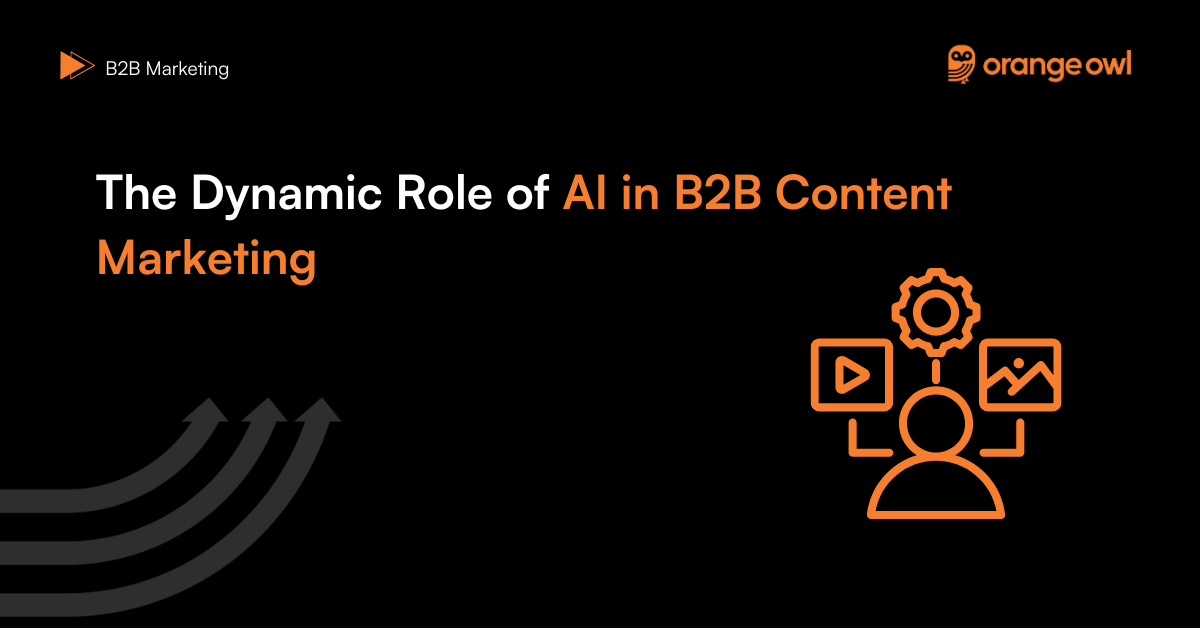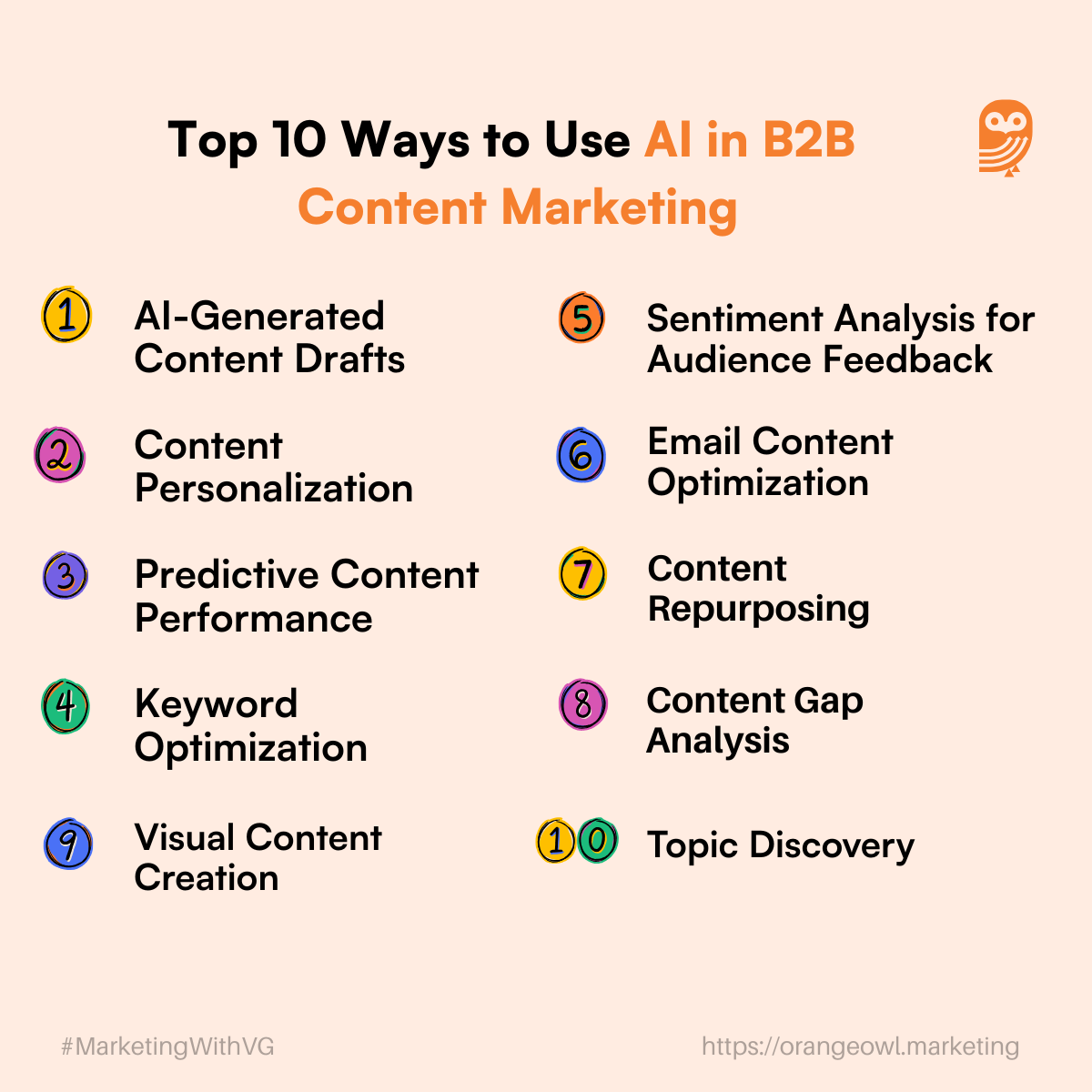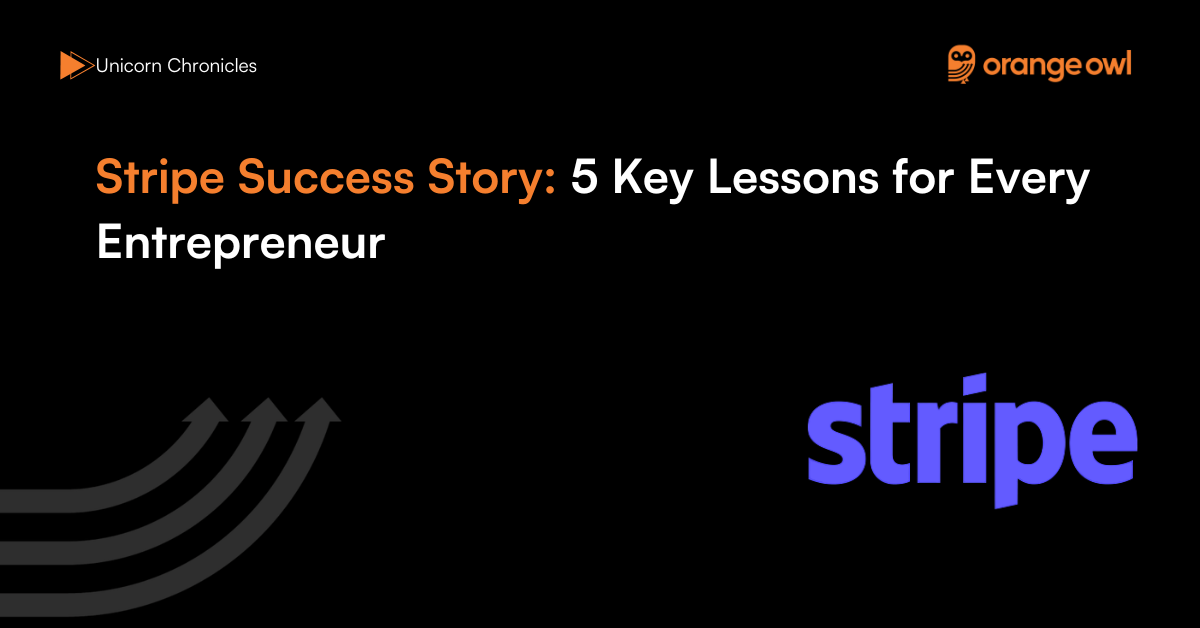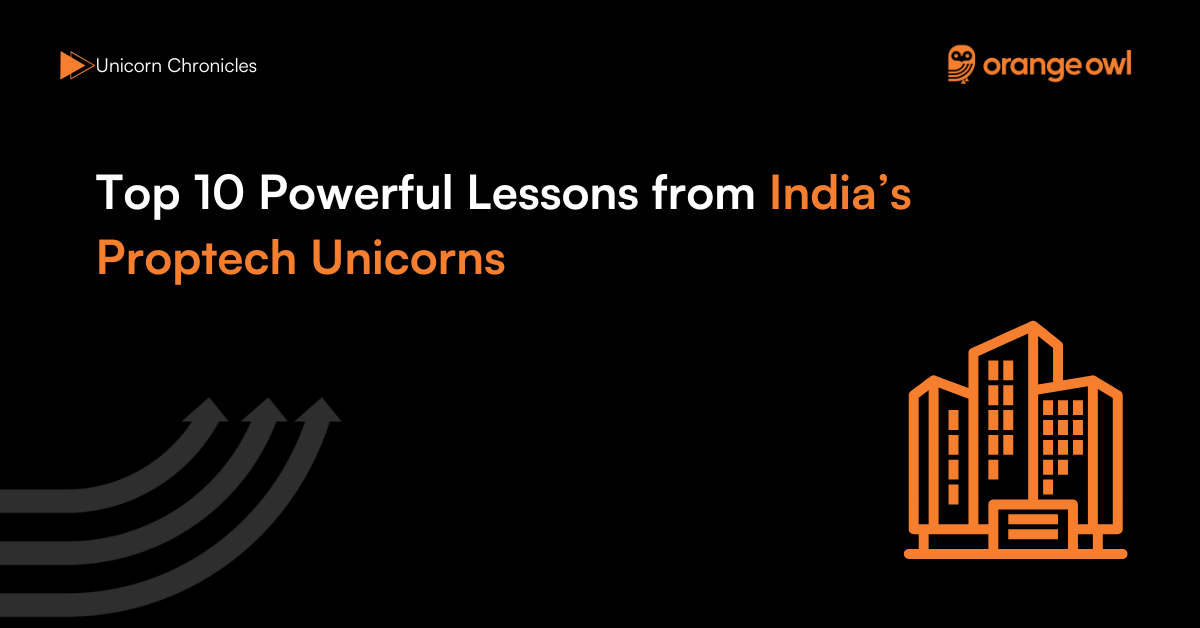The Dynamic Role of AI in B2B Content Marketing
Vivek Goel
April 5, 2025

Table of Contents
Introduction
The Role of AI in B2B Content Marketing is becoming increasingly vital as businesses strive to produce high-quality content at scale, personalize customer interactions, and drive measurable results. In today’s fast-paced digital landscape, content remains king—but relevance, timeliness, and efficiency are now just as important as creativity. That’s where Artificial Intelligence (AI) steps in, revolutionizing how B2B marketers approach content creation, strategy, and distribution.
AI is not just a tool for automation; it’s a powerful enabler of data-driven decisions and hyper-personalized experiences. By leveraging AI technologies, marketers can generate content more efficiently, predict what resonates with specific audience segments, and optimize performance across platforms. From natural language processing (NLP) for drafting articles to machine learning models that analyze user behavior, AI is transforming every stage of the content marketing funnel.
According to a recent Semrush study, 53% of marketers already use AI-powered tools for content marketing, and businesses integrating AI into their strategies report a 30% increase in content engagement and a 35% boost in lead generation. These numbers underscore the tangible impact AI can have on marketing performance and ROI.
This blog explores how AI is revolutionizing B2B content marketing—from strategy development to content distribution—by enabling smarter, faster, and more impactful marketing efforts.
What is AI in B2B Content Marketing?
AI in B2B content marketing refers to the integration of advanced technologies like machine learning, natural language processing (NLP), and predictive analytics to enhance and streamline various stages of the content marketing lifecycle. From strategy formulation to execution and performance optimization, AI is reshaping how B2B marketers create, manage, and deliver content.
At its core, AI empowers marketers to move beyond manual, time-consuming tasks by automating processes such as:
- Keyword research: AI tools can analyze search trends, competitor content, and user intent to suggest high-impact keywords.
- Topic generation: Based on audience interests and trending themes, AI can recommend content topics likely to drive engagement.
- Content creation: With the help of NLP and generative AI models, marketers can draft blogs, whitepapers, email campaigns, and social media posts more efficiently.
- Content optimization: AI can assess readability, SEO performance, tone, and structure to ensure content aligns with best practices.
- Performance tracking and analytics: AI analyzes data in real time to monitor how content performs across channels, identifying what works and where to improve.
- Personalization at scale: AI systems analyze user behavior, preferences, and engagement history to deliver tailored content experiences to different buyer personas and customer segments.
In the B2B landscape, where buyer journeys are complex and decision-making cycles are longer, delivering the right content at the right time is crucial. AI makes this possible by uncovering actionable insights from large datasets and adapting strategies dynamically. Whether it’s personalizing a case study for a specific industry or recommending follow-up content based on user interaction, AI ensures that content marketing efforts are not just efficient—but also impactful.
By leveraging AI in B2B content marketing, companies can boost content relevance, improve engagement rates, and achieve greater ROI—all while freeing up time and resources to focus on creativity and strategy.
Why is AI Important in B2B Content Marketing?
In the B2B space, content marketing is often complex, requiring tailored messaging for niche audiences, long sales cycles, and high-value offerings. AI has emerged as a game-changer by enhancing both the efficiency and effectiveness of content marketing strategies. Here’s how:
1. Intelligent Content Creation
AI-powered writing tools like ChatGPT, Jasper, and Copy.ai assist marketers in generating high-quality content at scale. These tools can produce a variety of content formats—from blogs and newsletters to case studies and whitepapers—based on specific inputs or prompts.
More importantly, they maintain consistency in brand voice and messaging, significantly reducing the time required for content development without sacrificing quality. AI can also repurpose existing content into new formats, extending the lifecycle of valuable assets.
2. Advanced Audience Segmentation
AI leverages large datasets to analyze behavioral patterns, firmographic information, and customer intent, enabling marketers to accurately segment their B2B audiences.
Whether it’s segmenting by industry, job role, company size, or buying behavior, AI ensures that content is aligned with each segment’s specific needs. This enables marketers to deliver more relevant messaging tailored to each buyer persona and stage of the sales funnel, resulting in better engagement and higher conversion rates.
3. Content Personalization at Scale
Personalization has become a necessity in modern marketing—and AI makes it scalable. By continuously monitoring user interactions, search behavior, and content preferences, AI can recommend personalized articles, suggest tailored calls-to-action (CTAs), and even adjust email campaigns.
This level of dynamic personalization helps marketers increase content engagement, reduce bounce rates, and create more meaningful experiences that nurture leads through the funnel.
4. Performance Analytics & Optimization
Understanding what content works—and why—is critical for B2B marketers. AI-powered analytics tools track key performance indicators (KPIs) such as engagement rate, time-on-page, scroll depth, click-through rate, and conversions.
These insights help marketers understand audience behavior and content effectiveness. Moreover, AI tools go a step further by offering real-time optimization suggestions, such as adjusting headlines, updating metadata, or tweaking publishing times to maximize reach and ROI.
5. Cost and Time Efficiency
AI automates repetitive, time-consuming tasks like grammar and plagiarism checks, summarization, keyword insertion, and image selection. By offloading these low-value tasks, marketing teams can focus on high-impact activities such as strategy, storytelling, and creative ideation.
This not only reduces content production costs but also shortens turnaround time—allowing businesses to react quickly to market changes and emerging trends.
Top 10 Ways to Use AI in B2B Content Marketing
Use Case 1: AI-Powered Topic Discovery
AI tools like BuzzSumo, MarketMuse, and Semrush utilize machine learning and natural language processing to analyze real-time search trends, competitor strategies, and user behavior across platforms. These insights help marketers uncover high-performing, relevant content topics that resonate with their target audience.
Hypothetical Example
A SaaS company specializing in project management tools uses an AI platform to identify emerging keywords and trending themes related to “remote team collaboration.” The company creates timely, top-of-funnel blog posts around those insights, resulting in a 35% increase in organic traffic and improved SERP rankings within two months.
Use Case 2: AI-Generated Content Drafts
AI-powered writing assistants like Jasper, ChatGPT, and Copy.ai generate content drafts for blogs, newsletters, product descriptions, and email campaigns. These tools accelerate content production by transforming simple prompts into structured, brand-aligned narratives.
Hypothetical Example
A B2B digital marketing agency automates its weekly blog creation process using Jasper, generating polished first drafts in under an hour. This efficiency enables the team to double their publishing cadence while maintaining consistency and tone.
Use Case 3: AI-Driven Content Personalization
AI systems analyze user behavior, purchase history, and content interaction to deliver customized content recommendations. Platforms like PathFactory and Uberflip use AI to dynamically serve content based on visitor profiles and stage in the buyer journey.
Hypothetical Example
A cybersecurity firm implements AI-powered personalization to showcase relevant whitepapers and case studies to different audience segments. As a result, lead conversion rates increase by 30%, thanks to more relevant and targeted content.
Use Case 4: Predictive Content Performance
AI models evaluate historical data to predict how a new content asset is likely to perform before it’s published. These predictions help marketers prioritize content types, formats, and channels with the highest ROI potential.
Hypothetical Example
A B2B marketing consultancy uses AI to simulate the performance of proposed video content. Based on the model’s predictions, the firm reallocates resources toward blogs and webinars—reducing bounce rates by 25% and improving time-on-page.
Use Case 5: AI for Keyword Optimization
AI tools like Surfer SEO and Clearscope analyze search intent and competitor content to recommend keyword improvements. They also suggest keyword density, structure, and semantic variations to enhance search rankings.
Hypothetical Example
A B2B blog for an HR tech company uses Clearscope to update older articles with AI-suggested keywords and formatting. The result? A 40% increase in organic visibility within three months.

Use Case 6: AI-Powered Visual Content Creation
AI platforms like Canva AI, Designs.ai, and Visme can generate on-brand visuals—including infographics, thumbnails, and data charts—based on text input or article context.
Hypothetical Example
A consulting firm integrates AI tools to automatically generate visual summaries for their thought leadership blogs. Engagement metrics improve significantly, with social media shares increasing by 28%.
Use Case 7: Content Gap Analysis Using AI
AI-powered platforms assess a brand’s content inventory against competitors to detect missing themes, underutilized keywords, and underexplored topics. This helps marketers identify gaps and content opportunities.
Hypothetical Example
A fintech company uses MarketMuse to audit its blog content and discovers it’s missing content on “embedded finance.” By filling the gap, the company gains a 20% competitive edge in search traffic.
Use Case 8: AI-Enhanced Content Repurposing
AI tools like Narrato and ContentBot can convert long-form content into multiple formats, such as email newsletters, LinkedIn posts, or video scripts—maximizing the ROI of each asset.
Hypothetical Example
A B2B tech company repurposes a single whitepaper into blog snippets, social posts, and a YouTube explainer script using AI. This strategy saves 50% of content development time and extends reach across platforms.
Use Case 9: Sentiment Analysis for Audience Feedback
AI-powered sentiment analysis tools assess user reactions in real time by scanning comments, reviews, and social media mentions. These insights help marketers gauge audience sentiment and fine-tune messaging.
Hypothetical Example
A B2B marketing agency tracks negative sentiment around a newly launched ebook using AI. The tool highlights language perceived as too technical, prompting revisions that lead to a 15% increase in reader satisfaction.
Use Case 10: AI-Powered Email Content Optimization
AI tools like Seventh Sense, Phrasee, and Mailchimp’s Smart Platform optimize subject lines, layout, CTAs, and send times to increase open rates and conversions.
Hypothetical Example
A CRM solutions provider uses Phrasee to optimize its weekly email campaigns. With AI-generated subject lines and CTA placements, email open rates jump by 38%, boosting webinar registrations and demo requests.
Common Myths vs. Facts About AI in Content Marketing
Myth 1: AI will replace content marketers.
Fact: AI is a powerful assistant, not a replacement. While AI excels at automating repetitive and time-consuming tasks—like drafting initial content, generating topic ideas, or analyzing data—human creativity, emotional intelligence, and strategic thinking remain irreplaceable. Marketers still lead the charge when it comes to storytelling, brand voice, and aligning content with business goals. AI helps marketers do more, not become obsolete.
Myth 2: AI-generated content lacks originality.
Fact: It’s true that AI pulls from existing datasets to generate content, but it doesn’t mean the results are generic. With the right inputs and creative direction, AI tools can produce highly relevant and engaging content. Ultimately, it’s up to marketers to refine tone, style, and context to ensure the output aligns with brand identity and audience expectations. Think of AI as a co-writer that works at your pace—suggesting, supporting, and streamlining.
Myth 3: AI content tools are only for big businesses.
Fact: Thanks to the rapid growth of SaaS and AI startups, most AI-powered content tools are accessible to businesses of all sizes. Platforms like Jasper, Copy.ai, and Grammarly offer flexible pricing plans that scale based on usage. Many tools even offer free tiers or affordable options ideal for startups and small marketing teams, making AI a democratized resource—not just a luxury for enterprises.
Myth 4: AI can’t understand complex B2B topics.
Fact: While AI isn’t an industry expert out of the box, it can process vast amounts of industry-specific data, jargon, and case studies to generate contextually accurate content. With detailed prompts and clear guidelines, AI can help create drafts on even the most technical B2B subjects. Moreover, marketers can always refine and fact-check AI output to ensure precision and depth—making it a helpful collaborator in tackling niche topics.
Myth 5: AI content won’t rank well on search engines.
Fact: When used strategically, AI-generated content can perform exceptionally well in SEO. Tools like Surfer SEO and Clearscope help optimize content for keywords, structure, and readability. Combined with human insights and SEO best practices, AI-powered content can achieve high search visibility, improved rankings, and better engagement. In fact, many AI-assisted articles are now competing head-to-head with traditionally written content in SERPs.
Emerging AI Trends Shaping B2B Content Marketing
1. AI-Generated Interactive Content
Artificial Intelligence is making it easier for B2B marketers to create engaging, interactive content formats such as quizzes, assessments, ROI calculators, and dynamic infographics. These formats not only capture attention but also drive deeper engagement by providing personalized experiences based on user input.
AI tools can analyze audience behavior to recommend the best type of interactive content, automatically generate logic flows, and even personalize results in real time. This not only enhances user experience but also helps collect valuable first-party data, which can be used for targeted follow-ups and lead nurturing.
2. Voice and Conversational Content Creation
With the growing popularity of podcasts, voice assistants, and audio-based content consumption, AI is stepping in to help marketers create content tailored for voice platforms. AI tools can now generate conversational blog formats, draft podcast scripts, and even produce voiceovers using synthetic speech technology.
This makes it easier for B2B brands to repurpose existing content into formats that resonate with busy professionals who prefer to listen rather than read. As a result, businesses can broaden their content distribution strategy and cater to a wider audience across different touchpoints.
3. AI-Powered Multilingual Content Expansion
Global B2B marketing requires speaking to audiences in their native language, and AI is significantly reducing the barriers to achieving this. Advanced translation tools powered by machine learning can now localize content into multiple languages while preserving tone, intent, and industry-specific terminology.
This allows companies to scale their content strategies internationally without the high costs and delays of traditional translation methods. By using AI for multilingual content creation, businesses can connect more effectively with international prospects, enhance user trust, and increase conversions across diverse markets.
Best AI Tools for B2B Content Marketing
1.Jasper – AI Content Writer for Blogs, Ads, and Emails
Jasper is one of the most popular AI writing tools used by B2B marketers to create high-quality written content at scale. It helps generate blog posts, ad copy, email campaigns, landing page content, and more—all while allowing users to define tone of voice, brand messaging, and audience type.
Jasper’s versatility makes it ideal for creating consistent and engaging content across various customer touchpoints. For B2B teams working with limited resources, Jasper streamlines content production and reduces time-to-publish without compromising quality.
2.MarketMuse – AI Content Strategy Tool for Topic Research and SEO Planning
MarketMuse is a powerful AI-driven platform designed for content planning, topic research, and content gap analysis. It helps B2B marketers identify high-potential topics, cluster keywords, and structure long-form content that ranks well in search engines.
What sets MarketMuse apart is its ability to provide real-time content scores, competitive benchmarks, and optimization suggestions. It’s particularly useful for companies with complex offerings or technical products that require authoritative and in-depth content to attract and convert leads.
3.Copy.ai – AI-Driven Short-Form and Long-Form Content Generation
Copy.ai is an intuitive AI writing assistant that excels in producing both short-form marketing copy and long-form content. It’s commonly used for writing product descriptions, social media posts, blog intros, email subject lines, and even detailed articles.
Its simple interface and diverse content templates make it a go-to for B2B marketers who need fast, creative outputs without spending hours on brainstorming. Whether you’re crafting a LinkedIn update or a sales email, Copy.ai helps maintain momentum across your content funnel.
4.Surfer SEO – AI Tool That Optimizes Content for Search Engine Performance
Surfer SEO integrates seamlessly with content writing workflows to help B2B marketers optimize their articles for maximum search visibility. It analyzes top-performing pages for any given keyword and provides data-driven recommendations on word count, keyword placement, structure, and even readability.
Surfer’s content editor can be used alongside tools like Jasper, making it easier to create SEO-optimized content from the start. For marketers focused on organic growth, Surfer SEO ensures your content competes effectively in search engine results.
5.Frase – AI Assistant for Content Research and SEO-Driven Content Briefs
Frase is a research-first AI platform that helps B2B marketers streamline the content creation process by automatically generating content briefs and outlines based on SERP analysis. It identifies common questions users are asking, summarizes top-ranking content, and suggests how to structure your own pieces for maximum impact.
Frase is especially useful when creating pillar pages, whitepapers, or knowledge-base articles, as it ensures your content is comprehensive, relevant, and optimized for both humans and search engines.
Conclusion
AI in B2B Content Marketing is not just a trend—it’s a transformative force reshaping how businesses plan, produce, and promote content in a digital-first world. By leveraging AI-driven tools, marketers can streamline content creation, personalize user experiences at scale, and gain data-backed insights that lead to smarter decision-making. Whether it’s automating blog writing, optimizing SEO strategies, or delivering tailored messaging, AI empowers B2B marketers to do more with less—faster and with greater precision.
As the demand for relevant, high-quality content continues to grow, AI in B2B Content Marketing serves as a strategic enabler that boosts efficiency without compromising creativity. It allows businesses to consistently engage their target audience across multiple touchpoints while adapting to changing market dynamics in real time. By incorporating AI into every stage of the content marketing lifecycle—from ideation to performance analysis—companies can drive stronger ROI, improve lead generation, and maintain a competitive edge.
Looking ahead, the role of AI in B2B Content Marketing will only become more pivotal. With rapid advancements in machine learning, natural language processing, and automation, the future of content marketing lies in intelligent systems that can co-create, optimize, and deliver value-driven content at scale. For organizations seeking to thrive in a crowded digital space, embracing AI is no longer optional—it’s essential for long-term success.
Frequently Asked Questions(FAQs) on AI in B2B Content Marketing
Yes, AI can generate well-structured and informative content, especially when guided by detailed prompts and relevant data. Tools like Jasper and Copy.ai can produce blog posts, email drafts, and case studies that align with industry standards. However, human intervention is essential to refine tone, add domain-specific nuance, ensure accuracy, and maintain brand voice. A collaborative approach—AI for drafting and humans for editing—yields the best results in B2B content marketing.
AI tools like Surfer SEO and MarketMuse analyze top-ranking pages and provide actionable insights such as keyword suggestions, optimal content length, and recommended headings. They also assist in crafting SEO-friendly meta titles, descriptions, and alt texts. By using AI to guide on-page SEO efforts, B2B marketers can significantly enhance content visibility, improve rankings, and attract more qualified organic traffic to their sites.
Absolutely. With access to quality industry-specific data and clear prompts, AI tools can generate content tailored to niche B2B sectors like fintech, cybersecurity, or supply chain logistics. Marketers can feed the AI with relevant terminology, tone preferences, and sample content, allowing it to produce drafts that align with complex topics. Human expertise further ensures that the content meets technical accuracy and regulatory standards where needed.
AI-generated content, while efficient, can sometimes lack originality, display a generic tone, or include factual inaccuracies. There’s also the risk of unintentional plagiarism if the tool draws too heavily from existing online content. To mitigate these risks, marketers must use plagiarism checkers, fact-check AI outputs, and customize content to reflect the brand’s unique perspective. Human oversight remains crucial for ensuring content quality and credibility.
Yes, AI tools can play a major role in shaping content strategy by analyzing past performance metrics and identifying what types of content resonate most with target audiences. They can suggest high-potential topics, ideal publishing frequencies, content formats, and distribution channels. This data-driven approach enables B2B marketers to build smarter editorial calendars and allocate resources to content types that drive the most engagement and conversions.
AI-powered personalization engines segment users based on firmographics, behavior, engagement history, and intent signals. They dynamically deliver tailored content such as case studies, product pages, or email sequences aligned with each user’s stage in the buyer journey. For example, a visitor from a healthcare company may be shown industry-specific use cases, improving relevance and increasing the likelihood of conversion.
AI tools offer in-depth analytics on user interactions with content, such as scroll depth, time spent on page, click-through rates (CTRs), bounce rates, and engagement patterns. Some platforms also provide predictive insights—like forecasting which content types will perform well or identifying underperforming topics. These insights help marketers continuously optimize their content strategy based on real-time and historical data.
Yes, AI significantly reduces content creation costs by automating repetitive tasks like drafting, editing, formatting, and basic design. Instead of hiring large content teams or outsourcing, businesses can rely on AI tools to manage a significant portion of the content pipeline. This not only reduces overhead but also accelerates production, helping B2B marketers do more with fewer resources.
Yes, ethical considerations include transparency, accuracy, and content attribution. Marketers should disclose when AI is used in content creation, verify facts through credible sources, and avoid misleading or manipulative outputs. It’s also important to prevent bias in AI-generated messaging, especially in industries where accuracy and neutrality are vital. Adopting ethical AI practices builds trust and safeguards brand reputation
Definitely. AI translation and localization tools can adapt content into multiple languages while retaining tone, context, and cultural nuances. This is especially valuable for B2B companies expanding into global markets. AI not only speeds up the localization process but also helps ensure consistency across regions, enabling businesses to connect meaningfully with international audiences while reducing costs tied to manual translation.


